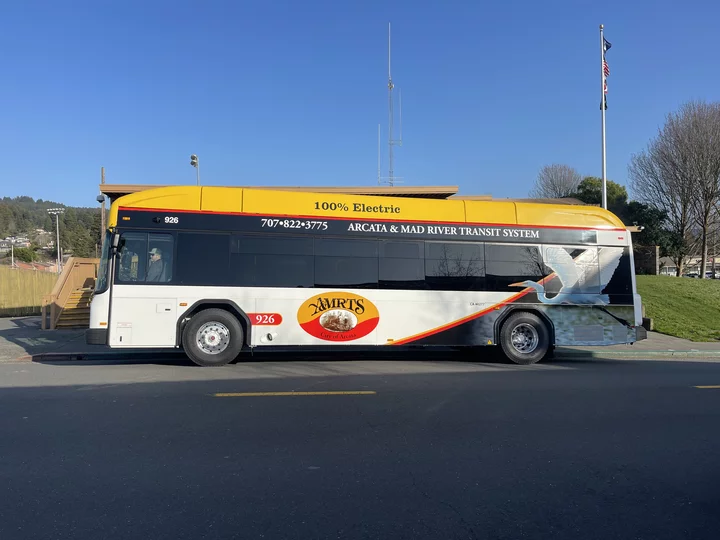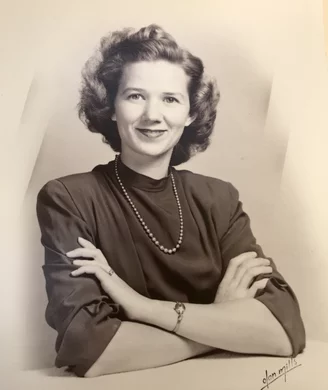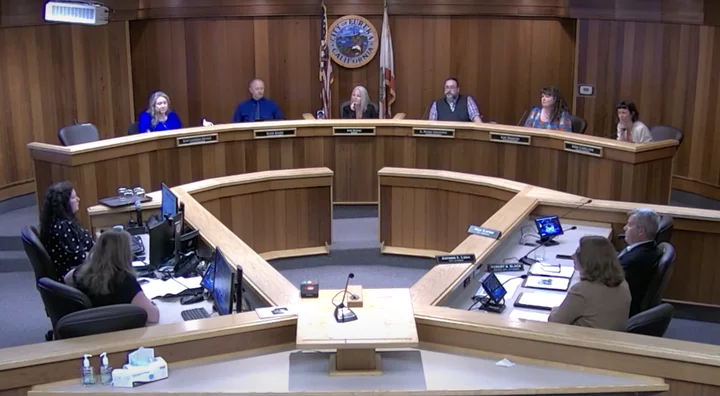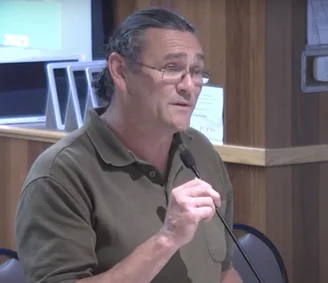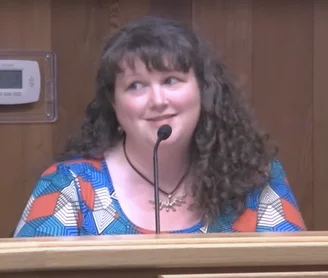Another Month of Free Bus Rides?! Arcata Says That Free Public Transportation in June Has Been Extended Through July
LoCO Staff / Friday, June 23, 2023 @ 1:56 p.m. / Transportation
One month of free rides on these buses is just not enough, says the City of Arcata. | File photo
###
Press release from the City of Arcata:
The City of Arcata Transportation Division is excited to announce that the Arcata and Mad River Transit System (A&MRTS) free bus rides have been extended through July!
The City encourages Arcata residents and visitors to take the bus to run errands and to explore Arcata’s neighborhoods, businesses, parks and recreational spaces. The goal of this program is to increase ridership for A&MRTS by showing how easy it is to use the transit system. A summer month was selected for this program as historically the ridership is low in summer months because schools, including Cal Poly Humboldt, are not in session. Last year, there was an approximately 10% increase in ridership during the implementation of this program in June and July of financial year (FY) 21-22 compared to FY 20-21. The division is excited about increasing that percentage in FY 22-23. Funding to support this program comes from the Low Carbon Transit Operations Program (LCTOP).
Free bus rides in Arcata began on June 1 and have now been extended through Monday, July 31 with A&MRTS offering transit routes that run Monday through Saturday from 7 a.m. to 7 p.m. during the summer months.
For more information regarding bus routes and schedules, visit hta.org/agencies/arcata-and-mad-river/ or call (707) 822-3775.
BOOKED
Today: 7 felonies, 15 misdemeanors, 0 infractions
JUDGED
Humboldt County Superior Court Calendar: Friday, Oct. 10
CHP REPORTS
No current incidents
ELSEWHERE
NY Times : How Oakland, Awash in Garbage, Is Trying to Take Out the Trash
Washington Post: China’s demographic crisis means it’s going to run out of workers
Washington Post: Maine high school offers hikes instead of detention. Teachers are seeing results.
Washington Post: A one-click button to protect your privacy is finally real
Humboldt Cultivators Win Multiple Cannabis Awards, Including ‘Best of California,’ at State Fair
Ryan Burns / Friday, June 23, 2023 @ 12:23 p.m. / Cannabis
Employees at MOCA Humboldt harvest flower at the business’s Eureka-based facility. | Photos by Ryan Burns
###
In just the second year of the California State Fair’s annual cannabis competition, growers from Humboldt County nabbed a total of 18 awards, including three of the 11 Golden Bear trophies bestowed on the overall winners, aka the “Best of California.”
MOCA Humboldt, a Eureka-based micro-business that includes an indoor cultivation operation, commercial kitchen, distribution facilities and a dispensary, took home two Golden Bears for the second year in a row.
“It’s exciting,” said MOCA CEO Matt Engel. “This is a really cool competition because most competitions are based on judges’ experiences. … This one is specifically based on lab results, so it’s objective judging.”
The science-based contest includes awards in three divisions — indoor, outdoor and mixed light — and 11 categories per division, based on measured levels of various compounds: cannabinoids, individual terpenes and total terpene content. (You can read about what those are, and the difference between them, here. Engel offered this analogy: “If cannabinoids are the volume on your stereo, terpenes are kind of like the EQ.”)
MOCA’s Golden Bear trophies were awarded for the level of CBGa in their strain “Grape Cookies” and for the level of Limonene in their strain “Caffeine.” In total, MOCA walked away with four golds and three silvers.
Engel said these awards are different from other judged competitions such as the Emerald Cup not only because of the lab-testing-based criteria but also because of the reach and reputation of the California State Fair.
“It’s a different perspective, but it’s really cool because this is shared with the world and you get a much wider reach by putting [cannabis] next to wine and cheese and other craft things,” he said. “It’s very cool.”
The other Humboldt County cultivator to land a Golden Bear was Talking Trees Farms, for the amount of Caryophyllene (a “spicy” terpene) in their outdoor strain “Rainbow Beltz.” The business also landed a gold medal for the level of Myrcene (a terpene also found in hops and lemongrass) in their mixed-light strain “Macalato.”
“We’re pretty stoked,” said Talking Trees Founder and CEO Craig Nejedly, who also highlighted the unique judging criteria of this contest.
“We just looked at what we had the highest terpenes in,” he said regarding the company’s decision to enter. “It was somewhat a gamble, but we knew we had a chance.”
Last year, Talking Trees took home one gold medal and three silvers, and Nejedly said he was excited to land two golds, including a Golden Bear, this year, though he noted that the influence of awards has diminished some in recent years.
“Like with the Emerald Cup, five years ago there was a lot more hoopla. It seems like awards are not as impactful [anymore].” But he was grateful that the State Fair focuses on terpenes rather than potency, or THC content, which has become a driver in the market. Connoisseurs, though, know the value of terpenes, he said.
Both Nejedly and Engel said they’ve had to make adjustments to stay afloat during the dramatic downturn in the cannabis industry over the past couple of years. Engel opened MOCA’s Eureka dispensary last year, and his operation includes production of bubble hash. Nejedly said he has adjusted to the market by slimming down operations and trying to be more strategic.
Several other Humboldt County growers landed awards as well:
- SoHum’s Organic Medicinals took home a gold medal for the level of co-dominant terpene (MCL) in their outdoor strain “Jelmints.”
- Savage Farms (Ettersburg) landed a silver in the same category for its strain “Slurty 3.”
- Northern Emeralds (Arcata) took silver for the level of terpinolene in their indoor strain “Durban Poison” and another silver for the amount of limonene in their mixed-light strain “Legendary OMG.”
- True Mom & Pop (Bridgeville) won silver for the level of co-dominant terpene (MCL) in mixed-light strain “Banana Pancakes.”
Click here for a full list of winners.
MOCA Humboldt’s 2022 awards.
(PHOTOS) Down Comes Copco No. 2! Destruction of Hydroelectric Facility on the Klamath River is Under Way
LoCO Staff / Friday, June 23, 2023 @ 9:17 a.m. / Environment , Infrastructure
The deconstruction of Copco No. 2, the smallest of the four hydroelectric dams being removed, is well underway. | Photos by Shane Anderson, Swiftwater Films, courtesy KRRC.
###
PREVIOUSLY: Ground Has Been Broken on Klamath River Restoration, the World’s Largest-Ever Dam-Removal Project
###
Press release from the Klamath River Renewal Corporation:
The deconstruction of Copco No. 2, the smallest of the four hydroelectric dams being removed from the Klamath River, is underway. This week, crews removed the gates, walkway, and two of the five bays down to the spillway. This work was done to direct waters around the dam, rather than over it, allowing construction crews to do work through the summer months.
“While this is just the first step, it certainly is an exciting moment,” said Mark Bransom, CEO of the Klamath River Renewal Corporation (KRRC). “Crews are making fast progress in these early stages of the project, and we are on track with our removal timeline.”
Crews placed around 10 feet of rock on either side of the dam in order to reach the gates and bays for deconstruction. Much of the Copco No. 2 infrastructure remains in place below this rock surface. Deconstruction of this dam will continue through the summer, with final decommissioning and complete removal occurring sometime in September.
“We are pleased that we were able to make so much progress this week,” noted Dan Petersen, Kiewit’s Project Manager overseeing the removal of Copco No. 2 “But removing Copco No. 2 is still not a done deal. We expect to officially wrap up this phase of the dam removal project sometime in September.”
The other three dams, Iron Gate, Copco No. 1, and JC Boyle are expected to be removed next year, beginning with the drawdown of the reservoirs in January of 2024. Their incremental deconstruction will continue throughout the year, with construction activities expected to conclude sometime in late 2024.
Copco before removal activities.
OBITUARY: Florence Evelyn Badger Cox, 1924-2023
LoCO Staff / Friday, June 23, 2023 @ 6:56 a.m. / Obits
Florence Evelyn Badger Cox
Aug. 24, 1924 - March 5, 2023
Evelyn was born in Okemah, Oklahoma to Nola Frances Hyde Badger and Guy Edwin Badger. She was the longest-lived of eight siblings, reaching the age of 98 years and six months. On March 5, 2023 at her home in the presence of her family, she passed into her heavenly home.
After graduating high school, Evelyn attended college at Oklahoma State University in Stillwater, Oklahoma for two years. In 1945, she married Lee Cox and their first years of marriage were spent in Iowa City, Iowa where Lee was attending dental school while enlisted in the Navy.
After dental school, while still in the Navy, they moved several times, living in Texas, Guam, California and Japan and finally settling in Eureka in January, 1961 where Lee continued to practice dentistry for many years. Evelyn was his chair-side assistant from time to time through those years, so she knew a lot about teeth and dentistry. (Lee and Evelyn had one baby, John, who was born with two teeth — a rare phenomenon, especially for a dentist’s baby. An associated press photo of Lee and John went all over the world.) Evelyn and Lee were able to celebrate 58 wedding anniversaries together before his passing into heaven in March, 2004.
Evelyn and Lee were loving parents, grandparents and great-grandparents and took every opportunity to babysit or to help out family and friends in any way they could. Over the years they made many trips to Disneyland, taking 1 grandchild a year until most of them had been able to go. Evelyn taught some of her grandchildren how to read, took them to church, took them out to eat, watched movies and played games with them. Her house was the hub for every family get-together.
Evelyn was a cheerful, friendly, generous, wise, thoughtful and gracious person with a dry witty sense of humor. She was a good mother, a good friend and a good neighbor, always offering her help. She was dearly loved by her family and friends.
Evelyn took great joy in nature, loved flowers and birds (especially hummingbirds), the pets around her, Yosemite, etc. Her very favorite flower was a rose, “Just Joey” (which bore the name of one of her grandsons). Evelyn also loved coffee and was rarely ever without a cup in her hand. Her favorite color was yellow, echoing her sunny disposition. Being a beautiful woman of fashion in the 50’s and 60’s, one of her favorite “colors” was the leopard print.
Evelyn was a perennial student, reading and learning about many subjects, including: Christianity, history, politics, health, nutrition, art, computer technology, etc and collected many books on many subjects. She took classes including a painting class and painted many paintings which included family and friends in casual portraits.
Being interested in home decorating, she opened a design business in Eureka in the 1960s (Evelyn’s House of Fine Furniture). As a life-long learner, later in life, Evelyn learned how to use computers, a digital single lens reflex camera and an iPad. She took and printed many photos.
Evelyn loved Jesus and was a member of the First Baptist Church in Eureka, which she attended and supported for over 50 years. She shared God’s love through her kindness and generosity. When her children were teenagers, she was the leader of the church youth group. She was involved in the “Young Life” and “Eagle’s Nest” activities for teens. In later years, due to her interest in photography, she became the unofficial photographer for church activities and events for many years.
Evelyn was also interested in helping her community and became involved in several community programs. For a time, she, with other Christians, regularly visited and shared God’s love with the inmates at the Humboldt County jail. She taught reading to people through the Humboldt literacy project and through this organization, she made dear friends in the local Hmong community.
Evelyn and Lee had four children — Kitty and Michael Hugo, Susan Cox, John and Gigi Cox and Roger and Linda Cox; eight grandchildren- John, Jack, Kari, Katey, Ryan, Aaron, Andrew and Joey; and 11 great grandchildren- Keani Mia, Kameron, Avery and Austin, Jackson, Elle Rose, Aidan, Malakai, David, Dean and Lydia.
Her extended family includes Linda Cox’s four children- Rachyl and Jonathan, Jessica and Kearnon, Ryan and Hannah, and Jenny; and Linda’s eight grandchildren: Phoenix, Lian, Avery, Thane, Emily and Emma, Weston and Hudson.
Evelyn is survived by numerous nieces and nephews and their families:
- Badger Family: Brenda, Sara, Deven & Lynn & Asha, Anjali, Bill
- Helt Family: Carol, Ruth, Ken & Nelda
- Cox Family: Ann & Mark & Amy, Dan & Mary, Dee, Charlotte, Jane, Wayne, & Fred
- Family Friends: Lorna and Doris Jean of Iowa, Jeanette & Marcia, Lei & Bien, Raj & Donna
She is also survived by dear friends from the First Baptist Church in Eureka, including the “Blitz Girls” and her good friend, Cassie Wyland.
Evelyn was able to stay in her own home for the last four years with the help of her children and grandchildren, including her wonderful, caring, selfless and devoted sons and daughters-in-law, John & Gigi Cox and Roger & Linda Cox.
A celebration of Evelyn’s well-lived life will be held on July 14, 2023 at 1pm at the Eureka First Baptist Church, at Del Norte and E Streets in Eureka.
Evelyn is interred along side her husband, Lee, at Ocean View Cemetery in Eureka. In lieu of flowers, donations may be made to the Eureka First Baptist Church.
###
The obituary above was submitted on behalf of Florence Cox’s loved ones. The Lost Coast Outpost runs obituaries of Humboldt County residents at no charge. See guidelines here. Email news@lostcoastoutpost.com.
VEGAS (AGAIN), BABY! Avelo Restores Service to Las Vegas With Twice-Weekly Direct Flights To/From ACV
LoCO Staff / Thursday, June 22, 2023 @ 9:07 a.m. / Airport
Break out the water cannons! File photo via Avelo.
PREVIOUSLY:
###
Press release from Avelo:
Avelo Airlines announced today it is returning exclusive nonstop service between the Humboldt Bay Area and Las Vegas. Avelo is once again the only airline offering nonstop service between California Redwood Coast-Humboldt County Airport (ACV) and Las Vegas’ Harry Reid International Airport (LAS).Introductory one-way fares between ACV and Las Vegas start at $49*. Customers can make reservations at AveloAir.com. Avelo will now serve two nonstop destinations from ACV: Las Vegas and Los Angeles.
Avelo Airlines Chairman and CEO Andrew Levy said, “We are excited to return exclusive nonstop service between the Humboldt Bay Area and the Entertainment Capital of the World. Our Redwood Coast Customers know Avelo is ACV’s most affordable and reliable airline. Flying to Vegas — whether for a week-long vacation or a spontaneous weekend getaway — is now easier than ever. Our Eureka and Arcata Customers told us they missed Avelo’s convenient, low-fare access to Vegas, and we listened.”
Avelo’s exclusive twice-weekly nonstop service between ACV and Las Vegas begins on September 8, 2023. Avelo will operate the flight on Mondays and Fridays utilizing Boeing Next-Generation (NG) 737 aircraft.
ACV Director of Aviation Cody M. Roggatz, C.M. said, “We are elated to have Avelo providing our region with direct service to Las Vegas! Their low fares, and exemplary customer service, will better connect Humboldt County to the World and the World to the Redwood Coast.”
California Child Care Providers Demand Raises From Gov. Newsom as Budget Deadline Looms
Jeanne Kuang / Thursday, June 22, 2023 @ 7:30 a.m. / Sacramento
State Sen. Eloise Gómez Reyes speaks to the crowd gathered for the Child Care Providers United rally at the state Capitol in Sacramento on June 15, 2023. Photo by Julie A Hotz for CalMatters.
The children who attend her home daycare in El Centro, in Imperial County near the Mexico border, are as young as 3 months old. Some are the children of farmworkers who drop them off at Guerrero’s house before their shifts in the pre-dawn hours. Nearly all are from families poor enough to qualify for state subsidies.
Many of the families can’t afford basic needs, Guerrero said, so the 57-year-old makes sure to provide their children with milk, diapers and sometimes clothes.
“I want the families to go to work knowing that (their children are) well taken care of, and they’re being loved and fed correctly,” she said.
Guerrero’s labor of love barely earns her a living. After paying two assistants and other costs, she figures she takes home about $3 or $4 an hour. She takes on credit card debt to keep her business going.
For years family child care providers — the vast majority of them women of color — have said they don’t get paid enough by the state of California to cover the costs of their businesses. Their fight for better pay and benefits, a two-decades-old effort, is reaching a fever pitch in California’s capital this year.
They’re pressing Gov. Gavin Newsom to raise their pay, and they have the Legislature on their side. Lawmakers put $1 billion for raises in their version of a state budget that they passed last week. That funding remains one of the key differences between Newsom and the Legislature as they hammer out a budget deal before July 1 that accounts for an estimated $32 billion deficit.
The full cost of California child care
Newsom deemed the child care industry critical to getting parents back to work and recovering the state’s economy from the pandemic. He signed legislation in 2019 allowing home child care providers like Guerrero to unionize and bargain with the state over subsidized child care reimbursement rates. And the state has issued multiple rounds of temporary stipends to providers who lost revenue during the pandemic.
But the 40,000-member union representing the home-based providers says Newsom’s administration isn’t offering providers enough to keep them in business long term. The union’s current contract expires in less than two weeks, at the end of June.
Bargaining for a new one this year, the union has called for a 25% bump in reimbursement rates the state pays to providers who care for low-income families’ kids — and state funding for the union to set up a trust to issue retirement benefits.
Providers staged a rally with about 2,000 members and supporters at the Capitol last week and plan to set up camp outside the Governor’s Mansion this week.
“As a direct result of their action, providers are gaining ground in negotiations towards pay increases and basic benefits — but we have yet to see a fair and just contract offer from the state,” said Max Arias, chairperson of the Child Care Providers’ Union, in a statement. “There appears to be no interest in committing to ongoing rate increases or covering the full cost of care.”
Family or home-based providers care for 28% of children who attend licensed facilities in California. Parents also send children to daycare centers or state-funded preschools, or pay a family member or friend.
A stopgap measure
To some advocates and members of the Legislative Women’s Caucus, even winning the raises would be only a stopgap measure to keep providers in business. The child care industry has experienced a slow recovery the past three year and still employs 5% fewer people than it did before the COVID-19 pandemic, according to a recent study by the UC Berkeley Center for the Study of Child Care Employment.
They’re pushing the state to move faster to fundamentally overhaul the way it calculates reimbursement rates. Sen. Monique Limón, a Democrat from Santa Barbara, authored a bill this year directing the state to overhaul the rates and provide the $1 billion raise in the meantime.
The $1 billion in the Legislature’s budget “solves an immediate problem,” she said. “It doesn’t solve the full, 10-year problem.”
The state’s reimbursement rates are generally tied to how much providers charge in the private market — but because many child care providers lower their prices to meet what parents can afford, the rates have ended up artificially low, in a system that a state-commissioned report last year described as a “market failure.” That in turn results in chronic shortages of child care for parents.
That report, on child care funding in California, was commissioned by a working group the state convened as part of its current contract with the child care union. In the report the national firm Prenatal to Five Fiscal Strategies, found California pays some daycare owners as little as a quarter of what the service costs.
A new model
In the southern region of the state, where Guerrero lives, the firm estimated it costs a home-based provider like hers more than $39,000 a year to provide quality care for one infant or toddler. The state reimburses about $12,000.
The same report recommended the state adopt a new method for calculating reimbursement rates that is based on real costs like the ones the firm calculated, rather than surveys of daycare rates. It has drawn support from both business and labor: a letter by the advocacy group Children Now urging the state to implement the recommendations was signed this year by the Service Employees International Union and the California Chamber of Commerce.
Asked to comment on the overhaul plan, both the state Department of Finance and the Department of Social Services said the issue is being negotiated with the child care union.
“Providers are gaining ground in negotiations towards pay increases and basic benefits — but we have yet to see a fair and just contract offer from the state.”
— Max Arias, chairperson of the Child Care Providers’ Union
No new payment method has been developed yet, though the state this year restarted the working group to advise on overhauling rates. Because the current rates are so low, a new model could be dramatically more expensive for the state. In some cases, providers may have to be paid three or four times what the state currently covers.
Advocates say it’s possible the state could come up with a new payment method that gradually, over several years, gets the pay closer to providers’ real costs.
Eric Peterson, director of client services and policy at Bananas, an Oakland agency that helps families find child care and subsidies to pay for it, sat on the working group that commissioned the cost report.
In nearly three decades in the field, Peterson said, pay for providers “has never been adequate.”
“Everybody knows… we can’t pay the true cost of care in a year,” he said. “The intent is to acknowledge the true cost and find a schedule to get there.”
###
CalMatters.org is a nonprofit, nonpartisan media venture explaining California policies and politics.
Eureka City Council Replaces Old Code of Conduct Handbook With New, ‘Less Problematic’ Version Amid Accusations of Ethics Violations From Some Members of the Public
Isabella Vanderheiden / Wednesday, June 21, 2023 @ 4:59 p.m. / Local Government
Screenshot of Tuesday’s Eureka Council meeting.
###
The Eureka City Council voted Tuesday to rescind and replace its “Councilmember Handbook” to address mounting concerns from some members of the public who allege that members of the council have violated the city’s code of conduct.
The policy contained in the new “Handbook” reinforces existing rules from state and federal entities that guide ethics and conduct standards for public officials.
The issue came about earlier this year when Eureka business owner Roy Gomez filed a claim for damages against the City of Eureka. The claim, in part, accused the city council of violating the city’s “Code of Ethics and Conduct for Elected and Appointed Officials.” Gomez had claimed that Councilmember Leslie Castellano, specifically, had violated the ethics policy in various ways after she, in her capacity as the executive director of the Ink People Center for the Arts, declined to assign a special event permit to sell alcohol at a function at Gomez’s former event venue, Forever Found.
Gomez has openly discussed his claims against the city during the non-agenda public comment portion of several recent city council meetings, going so far as to accuse several members of the council of being “undemocratic anarchists” seeking to dismantle capitalism.
During Tuesday’s meeting, Assistant City Manager Pam Powell detailed the history of the city’s existing code of conduct, which was adopted in a narrow 3-2 vote by a previous council in May of 2017. The two dissenting council members questioned some of the provisions included in the code, and one of the council members refused to sign the document entirely. Former Eureka Mayor Frank Jager signed the document but rescinded his signature in 2018. “Once the mayor rescinded his signature, staff was kind of in a predicament over how we could enforce this document,” she said.
“The main issue with the document were First Amendment concerns,” Powell continued. “The document did not allow for the mayor, councilmembers, or board and commission members to use their title when endorsing a political candidate. Staff’s concerns centered on the enforceability of the document.”
Powell added that the document included provisions that gave the mayor “more power than the charter actually allows.” In fact, staff reported, the policies in the Handbook were never adopted into the city charter or its ordinances — they merely served as a voluntary set of guidelines that previous councilmembers could follow or not.
The code of conduct was not provided to new council members following the November 2018 election. However, staff worked with the former city attorney and city manager to ensure that the mayor and council followed rules outlined by California’s Fair Political Practices Commission (FPPC) and Assembly Bill 1234, which required elected officials to take an ethics course every two years.
Powell noted that “many elements” of the 2017 code of conduct document are included in the new handbook, including concepts of respect, staff relationships, rules, conflict of interest and ethics. “The new handbook does not contain any provisions regarding council members and their use of titles should they support a political candidate,” she said. “Staff believes that the council handbook confirms the city’s commitment to strong ethics and transparency.”
Councilmember Kati Moulton asked what is covered in the city’s handbook that isn’t already required by the FPPC or other existing laws surrounding ethics and conflict of interest.
“I would agree with [Powell] that the things that are in the old code that aren’t in this new handbook are what we would consider somewhat problematic portions around whether or not city council members can use their title in supporting other candidates,” City Attorney Autumn Luna responded. “We didn’t think it was appropriate for the new code.”
Even so, Councilmember Renee Contreras-DeLoach asked if the city had an obligation to enforce the rules outlined in the document. Luna said she would not feel comfortable enforcing “questionable regulations against the council,” adding that the document “doesn’t have the force of law.”
“Let’s just remember that, hierarchically, we have really important and complex laws coming from the state and coming from the FPPC,” Luna continued. “I don’t mean to drive this home too many times, but you are not setting conflict of interest rules for yourself and then rescinding them. Those rules are set elsewhere in the law, and you follow them because of that. Not because of a resolution [that was] passed by a different counsel at a different time.”
During the public comment portion of the discussion, Gomez criticized the city’s decision to ignore its own code of ethics. He asserted that the proposed handbook has “no actual teeth to it” and urged the council to amend the existing document.
“The one being rescinded … there’s accountability within it,” he said. “It’s important that we realize that the violations have been occurring because there’s been no code of ethics. You can’t just say, ‘Oh, I submitted a Form 700 and we’re good.’ Like, there are ongoing conflicts of interest on a daily basis. … To be honest with you, I actually agree that the council members should be okay with endorsing [candidates]. Why not just rescind that piece out of it and then leave it as it is? It’s a good document as it is.”
(Note: Form 700 is a document used by public officials to disclose financial interests to ensure the public is aware of a public official’s financial interests and remind the public official of potential conflicts, according to the FPPC.)
Eureka resident Ash Teeter questioned the timing of the code of conduct update accused the city council of “changing the rules of the game that [it] might already be cheating in” and echoed Gomez’s previous claims that the council is a group of anarchists.
“Multiple city council members … support dismantling capitalism, anarchy and are affiliated with extremist groups like Antifa on their Twitter pages, as I found,” Teeter said. “It’s like they’re playing both sides of the game … sitting on the council chambers by day, plotting the downfall of the system by night.”
Arcata resident Jessica Frint said she did not intend to speak during public comment but felt compelled to after she heard Moulton swear under her breath during Teeter’s comments.
“When [he] asked her a question, she replied, ‘You asshole,’” Frint said. “If we have a code of conduct, I would assume that’s a violation. I would like to see you do something about it. … Or whoever is responsible for doing something about it, do something about it. That’s bad behavior.”
Following public comment, Moulton began to apologize for her “outburst” but was met with shouting from Gomez in the audience. Mayor Bergel interjected and requested that the council take a five-minute break.
Upon the council’s return, Contreras-DeLoach said she watched the May 2, 2017 city council meeting to better understand the history of the city’s code of conduct policy before voting on the matter. “And I feel very comfortable saying that I think the document is a redundant document,” she said.
“These are laws that already exist,” she continued. “These are things that we’re already held to, trainings we’ve already done, they’re things that we’ve already signed or stuff that we have to declare. … I don’t have any concerns moving forward with this.”
Contreras-DeLoach also acknowledged the public’s concerns surrounding the timing of the item.
“I acknowledge that doesn’t look great … [but] I think this is one of those things where, unfortunately, sometimes the veneer of something just gives you the wrong impression,” she said. “If someone doesn’t take the time to listen to what we’re saying or to look at these documents or to watch that council meeting, they may walk away from this thinking … we want to disband or abolish some code of ethics when in reality we’re held by much bigger laws.”
Contreras-DeLoach made a motion to approve staff’s recommendation to replace the ethics handbook with the new proposed document. Moulton offered a second to the action, as well as an apology.
“Thank you, Councilmember Contreras DeLoach for articulating what I was too heated to say,” Moulton said. “I want to apologize again to the mayor, Mr. Teeter and to the public for losing my cool and lowering the discourse when we should be elevating the discourse with information and with perspective.”
Before taking a vote, Councilmember Leslie Castellano noted that it isn’t out of the ordinary for the city council to repeal and replace documents.
“This is a fairly normal and natural part of city government,” she said. “You know, as we learn and grow as a populace we repeal and replace things and that’s healthy democracy. … I personally think that there are many reasons that problematic documents are changed … Often those are brought to our attention by citizens in various ways. This is also one of those instances where a citizen brought forward something that was problematic and we have an opportunity to change it.”
Councilmember G. Mario Fernandez echoed Castellano’s comments and said he felt comfortable moving ahead with the new document.
Councilmember Scott Bauer took a moment to dispute previous accusations that members of the council have anarchist affiliations, noting that the council had passed a budget earlier in the evening “that fully funds our police force and our firefighters.”
The motion passed in a unanimous 5-0 vote.
###
Other notable bits from Tuesday’s meeting:
- The city council unanimously approved the proposed budget for fiscal year 2023-24. Eureka’s Finance Director Lane Millar pointed out a few minor modifications to the proposed budget during a presentation to the council, including a request to transfer $9,000 in non-departmental funds to the mayor and council’s division for future town halls. Millar also discussed several potential investment opportunities through the state and federal governments which will be further discussed at a date uncertain.
- The city council approved a 10.44 percent rate increase for trash collection in Eureka in a 4-1 vote, with Fernandez dissenting.
- The council gave Public Works Director Brian Gerving the green light to accept a $5 million grant on behalf of the City of Eureka for a restoration project to enhance fish passage in a stream between Myrtle Avenue and Fourteenth Street. The item passed in a unanimous 4-0, with Bauer recusing himself.

